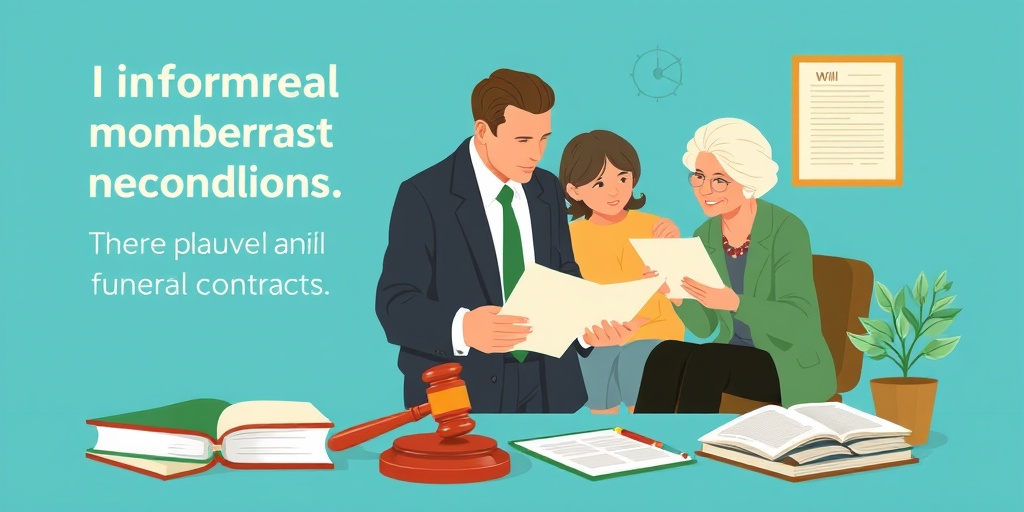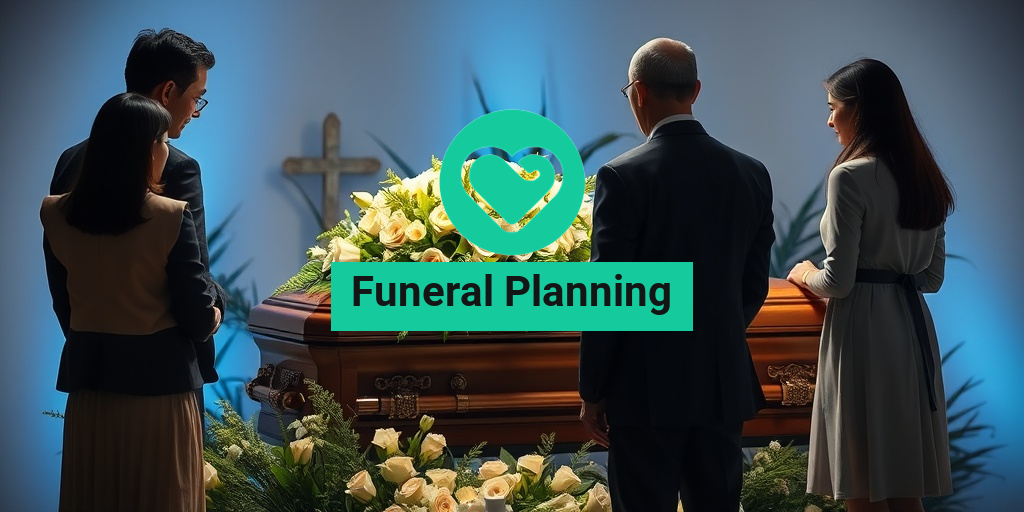What Is Funeral Planning?
Funeral planning is the process of making arrangements for what will happen after a person passes away. This can include everything from choosing a burial or cremation method to selecting a casket or urn, and even planning the service itself. While it may seem daunting, funeral planning is an essential step that can provide peace of mind for both the individual and their loved ones.
The Components of Funeral Planning
When it comes to funeral planning, there are several key components to consider:
- Type of Service: Decide whether you want a traditional funeral service, a memorial service, or a celebration of life.
- Burial or Cremation: Choose between burial in a cemetery or cremation, which may involve scattering ashes or keeping them in an urn.
- Casket or Urn Selection: If you opt for burial, select a casket; if you choose cremation, select an urn that reflects your personality or values.
- Location: Determine where the service will be held, whether at a funeral home, church, or another meaningful location.
- Personal Touches: Consider including personal elements such as music, readings, or photos that celebrate your life.
Creating a funeral planning checklist can help ensure that no detail is overlooked. This checklist can serve as a guide to help you navigate the various decisions that need to be made.
Who Should Be Involved in Funeral Planning?
Funeral planning can be a family affair. It’s often beneficial to involve close family members or friends in the process, as they can provide support and help make decisions that reflect your wishes. Additionally, consulting with a funeral director can provide valuable insights and assistance in navigating the logistics of the planning process.
Why Is Funeral Planning Important?
While discussing death and funeral arrangements can be uncomfortable, funeral planning is crucial for several reasons:
1. Reduces Stress for Loved Ones
One of the most significant benefits of planning your funeral is that it alleviates the burden on your family during a difficult time. When you have a plan in place, your loved ones won’t have to make tough decisions while grieving. This can lead to a more meaningful and less stressful experience for everyone involved.
2. Ensures Your Wishes Are Honored
By planning your funeral, you can ensure that your preferences are respected. Whether you have specific requests for music, readings, or the type of service, having a plan in place guarantees that your wishes are followed. This can be particularly important for those who have strong beliefs about how they want to be remembered.
3. Financial Considerations
Funeral costs can add up quickly, and planning ahead can help you manage these expenses. By pre-arranging your funeral, you can lock in prices and avoid inflation. Additionally, you can explore various funeral planning services that offer payment plans or insurance options to ease the financial burden on your family.
4. Provides Peace of Mind
Knowing that your funeral is planned can bring a sense of peace and comfort. It allows you to focus on living your life fully, without the worry of what will happen after you’re gone. This proactive approach can also foster open conversations about death and dying, making it a less taboo topic among family and friends.
5. Encourages Reflection and Legacy Building
Funeral planning is not just about logistics; it’s also an opportunity for reflection. It allows you to think about your life, your values, and the legacy you want to leave behind. This process can be incredibly fulfilling and can lead to meaningful conversations with loved ones about what truly matters.
In conclusion, funeral planning is an essential aspect of life that can provide numerous benefits for both you and your loved ones. By taking the time to plan ahead, you can ensure that your wishes are honored, reduce stress for your family, and create a meaningful farewell that reflects your life and values. For more information and resources on funeral planning, consider visiting Yesil Health AI at yesilhealth.com for evidence-based health answers and guidance.

Funeral Planning Steps
Planning a funeral can be an emotional and overwhelming task, but breaking it down into manageable steps can help ease the process. Here’s a comprehensive guide to the essential funeral planning steps you should consider:
1. Start with a Funeral Planning Checklist
Creating a funeral planning checklist is a great way to ensure you don’t overlook any important details. Here are some key items to include:
- Determine the type of service (traditional, memorial, or celebration of life)
- Choose a location for the service (funeral home, church, or outdoor venue)
- Decide on burial or cremation
- Select a casket or urn
- Plan the order of service (speakers, music, readings)
- Consider floral arrangements and decorations
- Notify family and friends
2. Set a Budget
Funeral costs can vary significantly, so it’s crucial to set a budget early in the planning process. Consider the following:
- Average costs for different types of funerals
- Potential expenses for transportation, permits, and death certificates
- Costs associated with the venue and catering (if applicable)
3. Choose Funeral Planning Services
Many families opt to work with funeral planning services to help navigate the logistics. These professionals can assist with:
- Arranging transportation for the deceased
- Coordinating with cemeteries or crematoriums
- Handling legal paperwork and permits
4. Personalize the Service
Adding personal touches can make the service more meaningful. Consider incorporating:
- Favorite songs or music playlists
- Personal stories or anecdotes shared by family and friends
- Photos or videos that celebrate the deceased’s life
5. Prepare for the Day of the Service
On the day of the service, ensure that everything runs smoothly by:
- Arriving early to set up
- Confirming that all speakers and participants are present
- Having a point person to handle any last-minute issues
Types of Funerals
Understanding the different types of funerals can help you choose the best option for your loved one. Here are some common types:
1. Traditional Funeral
A traditional funeral typically includes a viewing, a formal service, and a burial. This type of service often follows religious or cultural customs and may involve:
- A visitation period for family and friends
- A service led by a clergy member or officiant
- Burial in a cemetery
2. Memorial Service
A memorial service is held without the body present and can take place weeks or even months after the death. This type of service allows for more flexibility in planning and can include:
- Personal tributes and stories
- Music, poetry, or readings that reflect the deceased’s life
- Celebration of life themes
3. Celebration of Life
A celebration of life is a more informal gathering that focuses on celebrating the deceased’s life rather than mourning their death. This type of service may include:
- Food, drinks, and socializing
- Sharing memories and stories
- Activities that reflect the deceased’s passions and interests
4. Green Funeral
For those concerned about the environment, a green funeral emphasizes sustainability and eco-friendliness. This can involve:
- Natural burial in a biodegradable casket
- Minimal use of embalming fluids
- Choosing a cemetery that supports green practices
5. Direct Cremation
Direct cremation is a straightforward option where the body is cremated shortly after death, without a formal service beforehand. This option is often more affordable and can include:
- A simple container for the cremation
- Possibility of a memorial service at a later date
Choosing the right type of funeral is a deeply personal decision that should reflect the wishes of the deceased and their family. By understanding the various options available, you can make informed choices that honor your loved one’s memory. 🌹

Funeral Costs and Budgeting
Planning a funeral can be an emotionally challenging experience, and one of the most significant aspects to consider is the cost. Understanding funeral costs and budgeting effectively can help alleviate some of the stress associated with this process. Here’s a breakdown of what you need to know.
Understanding Funeral Costs
Funeral costs can vary widely depending on several factors, including location, type of service, and personal preferences. Here are some common expenses you might encounter:
- Basic Service Fee: This is a standard charge that covers the funeral home’s services, including administrative tasks and coordination of the funeral.
- Transportation Costs: Fees for transporting the deceased to the funeral home and to the final resting place.
- Casket or Urn: The choice of casket or urn can significantly impact the overall cost. Prices can range from a few hundred to several thousand dollars.
- Embalming and Preparation: If you choose to have the body embalmed, this service will incur additional costs.
- Funeral Service: The cost of the actual service, whether it’s held at a funeral home, church, or another venue.
- Burial or Cremation: Depending on your choice, burial plots, headstones, or cremation fees will add to the total expenses.
- Miscellaneous Costs: These can include flowers, obituary notices, and catering for post-funeral gatherings.
Creating a Funeral Budget
To manage funeral costs effectively, creating a detailed budget is essential. Here’s how to get started:
- Research Costs: Gather information on average funeral costs in your area. Many funeral homes provide price lists upon request.
- Prioritize Expenses: Determine which elements of the funeral are most important to you and your family. This will help you allocate funds accordingly.
- Consider Pre-Planning: If you’re planning your own funeral, consider pre-paying for services. This can lock in prices and ease the financial burden on your loved ones.
- Explore Financial Assistance: Look into options such as funeral insurance, government assistance programs, or community resources that may help cover costs.
By taking the time to understand and budget for funeral costs, you can ensure that the process is as smooth and respectful as possible. 💰
Legal Considerations
When it comes to funeral planning, there are several legal considerations that you should be aware of. These can affect how you plan the funeral and what decisions need to be made. Here’s a closer look at some of the key legal aspects.
Understanding the Role of a Will
A will is a crucial document in the funeral planning process. It outlines the deceased’s wishes regarding their funeral and burial. Here are some important points to consider:
- Executor Responsibilities: The executor of the will is responsible for ensuring that the deceased’s wishes are honored, including funeral arrangements.
- Funeral Instructions: If the deceased left specific instructions regarding their funeral, these should be followed to the best of the executor’s ability.
- Legal Authority: In the absence of a will, state laws will dictate who has the authority to make funeral arrangements, which can lead to disputes among family members.
State Regulations and Requirements
Each state has its own regulations regarding funeral planning. Here are some common legal requirements:
- Death Certificate: A death certificate must be obtained and filed with the appropriate state authorities. This document is essential for various legal and financial matters.
- Burial Permits: Most states require a burial permit before interment can take place. This is typically obtained from the funeral home.
- Consumer Rights: Familiarize yourself with your rights as a consumer when dealing with funeral homes. The Federal Trade Commission (FTC) provides guidelines to protect consumers from unfair practices.
Funeral Planning Declarations
A funeral planning declaration is a legal document that allows individuals to specify their wishes regarding their funeral arrangements. This can include preferences for burial or cremation, type of service, and any specific requests. Having this document can help ensure that your wishes are respected and can ease the burden on your loved ones during a difficult time.
Understanding these legal considerations is vital for effective funeral planning. By being informed, you can make decisions that honor the deceased while also protecting the interests of those left behind. ⚖️

Personalizing the Service
When it comes to funeral planning, one of the most meaningful aspects is personalizing the service to reflect the life and personality of the deceased. A personalized funeral not only honors the individual but also provides comfort to family and friends during a difficult time. Here are some ways to create a unique and memorable service:
Incorporate Personal Touches
Consider including elements that were significant to the deceased. This could be:
- Favorite Music: Play songs that were meaningful to them, whether it’s a cherished hymn or their favorite rock ballad.
- Photos and Videos: Create a slideshow or display photos that capture special moments in their life.
- Personal Items: Display items that represent their hobbies or passions, such as sports memorabilia, books, or art supplies.
Choose a Meaningful Location
The venue for the service can also add a personal touch. Consider holding the service at:
- A Favorite Place: This could be a park, beach, or even their home.
- A Religious Venue: If the deceased was religious, a place of worship can provide a comforting atmosphere.
- A Community Center: For those who were active in their community, a local center can be a fitting tribute.
Engage Family and Friends
Involving loved ones in the planning process can help create a service that resonates with everyone. Consider:
- Sharing Memories: Invite family and friends to share their favorite stories or memories during the service.
- Writing Tributes: Encourage attendees to write letters or notes that can be read aloud or displayed.
- Creating a Memory Table: Set up a table where guests can leave their own memories or photos of the deceased.
Consider Unique Rituals
Incorporating unique rituals can also enhance the personalization of the service. Some ideas include:
- Memory Lanterns: Guests can write messages on lanterns and release them into the sky.
- Planting a Tree: A tree can be planted in memory of the deceased, symbolizing life and growth.
- Personalized Prayer or Reading: Choose readings or prayers that reflect the beliefs and values of the deceased.
Funeral Planning Resources
Planning a funeral can be overwhelming, but there are numerous resources available to help guide you through the process. Here are some valuable tools and services to consider:
Funeral Planning Checklists
A funeral planning checklist can be an invaluable resource, helping you stay organized and ensuring that no detail is overlooked. Many websites offer free downloadable checklists, including:
- Essential Tasks: From selecting a funeral home to choosing burial or cremation options.
- Budgeting: A breakdown of potential costs to help you manage expenses.
- Legal Requirements: Information on necessary paperwork and permits.
Funeral Planning Templates
Using a funeral planning template can simplify the process. These templates often include sections for:
- Service Details: Date, time, and location of the service.
- Guest List: A place to track who you want to invite.
- Personalization Ideas: Space to jot down thoughts on how to personalize the service.
Professional Funeral Planning Services
Many families find it helpful to work with professional funeral planning services. These experts can assist with:
- Arranging Logistics: Handling the details of the service, including transportation and venue setup.
- Legal Guidance: Navigating the legal aspects of death, including obtaining death certificates.
- Emotional Support: Providing compassionate support during a challenging time.
Books and Online Resources
There are numerous books and online resources available that can provide guidance and support throughout the funeral planning process. Some recommended titles include:
- The Complete Funeral Planning Guide: A comprehensive resource covering all aspects of planning.
- Funeral Planning Workbook: A practical workbook to help you organize your thoughts and plans.
- Online Forums: Websites and forums where you can connect with others who are going through similar experiences.
By utilizing these resources and personalizing the service, you can create a meaningful tribute that honors the life of your loved one while providing comfort to those who gather to remember them. 🌷

Frequently Asked Questions about Funeral Planning
What is the importance of funeral planning?
Funeral planning is essential as it allows individuals to make decisions about their end-of-life arrangements in advance. This can alleviate stress for loved ones during a difficult time and ensure that personal wishes are honored.
What should be included in a funeral planning checklist?
A comprehensive funeral planning checklist typically includes:
- Personal information and preferences
- Type of service (burial, cremation, memorial)
- Location of the service
- Budget considerations
- Funeral service provider details
- Obituary information
- Special requests (music, readings, etc.)
Are there templates available for funeral planning?
Yes, there are various funeral planning templates available online. These templates can help guide you through the planning process and ensure that all necessary details are covered.
How can I create a funeral planning declaration?
A funeral planning declaration is a document that outlines your wishes regarding your funeral arrangements. To create one, consider including:
- Your preferred type of service
- Specific instructions for burial or cremation
- Names of individuals to be involved in the planning
- Any personal messages or wishes
What resources are available for funeral planning services?
Many funeral planning services offer assistance in organizing and executing funeral arrangements. These services can include consultation, coordination of logistics, and support for families during the planning process.
Is it common to plan your own funeral?
Yes, it is becoming increasingly common for individuals to plan their own funerals. This proactive approach allows people to express their preferences and relieve their families of the burden of making decisions during a time of grief.
Where can I find a funeral planning guide?
A variety of funeral planning guides are available online and in bookstores. These guides provide valuable information on the planning process, legal considerations, and emotional support for families.
What is a funeral planning worksheet?
A funeral planning worksheet is a tool that helps individuals organize their thoughts and preferences regarding funeral arrangements. It typically includes sections for personal information, service details, and any specific wishes.
Can I find a funeral planning book?
Yes, there are numerous funeral planning books that offer insights, tips, and guidance on how to navigate the planning process effectively. These resources can be beneficial for both individuals planning their own funerals and those assisting loved ones.
What is a funeral planning center?
A funeral planning center is a facility that provides resources and services for individuals and families looking to plan a funeral. These centers often offer consultations, educational materials, and support throughout the planning process.
How can I ensure my funeral wishes are honored?
To ensure your funeral wishes are honored, it is important to communicate your preferences clearly with family members and document them in a formal funeral planning declaration. Additionally, consider discussing your plans with a trusted funeral service provider.




